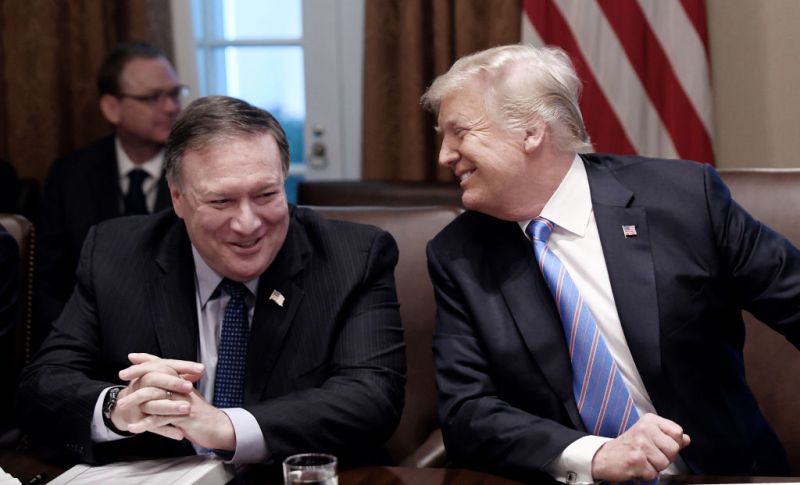A Long History of Being Manipulated into War...
The Lies Being Told To the American People
Dear Reader,
It is essential we take a look at all the times we have been mis-lead, before we commence retaliation of the attacks that occurred over the downed drone in some country. Never mind the fact that we were spying on them and Iran had every right to shoot it down.
“The U.S. government’s assessment indicates that Iran is guilty for the recent outbreaks in the Gulf of Oman”.
President Donald Trump does not fully agree with the statements of the Secretary of State Mike Pompeo. Mr. Pompeo said that it was obvious and unquestionable that Iran instigated the fresh attacks on the two oil tankers in the Gulf of Oman. He said the evidences were undeniable and definite. It is crazy to think we came within 10 minutes of fighting yet another war.

Secretary of State Mike Pompeo and President Trump share a laugh during a cabinet meeting
Deceits, falsifications, and deceptions abound in all the chapters of the history around the buildups to the World War I, World War II, Vietnam, Iraq war and the Mexican War. Maybe our past is shouting at us: you can’t be sure of your leaders when the thought of war sets in and there is intensification of war prospects. Don’t buy these lies.
The U.S. Central Command pushed out a video that seems to display anonymous faces in a small boat taking out an item from the side of a tanker. The U.S officials who called the item an ‘unexploded mine’ said this establishes the proof of Iran’s involvement. Even President Trump was convinced because he saw the boat in the video. But where are the proof?
The Germans and Japanese made it clear that the video was not a sufficient evidence. Hence, the reason they requested for more solid evidences than video Pentagon’s released.
Why would the government not just rely on the 2001 authorization against Afghanistan after the 9/11 occurrences on American soil? The statements of Politico are now stating that Trump’s government has been making the case in public and private that no different congressional approval would be needed to go to war with Iran.
This would impede a congressional discussion on the matter, taking away from the nation an opportunity to evaluate the truths before warfare really begin without leaving aside for few moments the portentous danger this poses to the constitutional principle that Congress is the fountain of the nation’s war building power. The following historical episodes discloses the significance of establishing those facts before the country goes to war.
Woodrow Wilson and World War I
Wilson was re-voted president in 1916 with just 49.2 percent of the total vote cast on his stated resolution to keep America out of Europe’s Great War. But it was deceptive, as he had always wanted to make America get to the world stage. Given subtle noninvolvement concerns forced on the U.S. by both Germany and Britain, it was difficult isolating the United States from the war throughout the season of election. In order to starve the population of women, men, and children, young and old suffer and comply, Britain’s aggressive Foremost Sea Lord, Winston Churchill, audaciously affirmed and declared the enforced barrier constructed to frustrate all trade to all the Central Powers and Germany.
Wilson made everything worse after Germany commenced submarine attacks intended to discontinue shipment of ammunitions to Britain and thwart the barricade, after he had primarily pursued to find his way through this neutral stance thicket. He not only detected the British barricade but also permitted the entry of armed British merchant ships into U.S. ports, which in turn brought up the streaming of American weapons to the Associated Powers. Ultimately he preferred the UK and involved in activities that was capable of drawing America into the war. Wilson confirmed that Americans had the right to travel on any preferred vessels. That even in time of war, the rule would hold even if affected Americans were working or travelling on British or French ships. He at the same time also stated that Germany would be held responsible for any loss of property or life in America through attacks from submarines of the Germans.
Under Churchill’s starvation policy, a frantic Germany, suffering awfully began unhindered submarine combat against ships transporting goods to France or Britain. Wilson quickly requested for a congressional announcement of war which he got. Meanwhile, Wilson’s secretary of state, William Jennings Bryan had warned the president to either implement a more evenhanded methodology or accept the unavoidability of war. Bryan eventually resigned over the issue, and he turned out to be correct.
Franklin Roosevelt and World War II
FDR practically desired to take America in when Europe was once again thrown into an obscure war in September 1939 after Nazi Germany's attack of Poland. But the country did not want to go into the disagreement. They still clung on to the nasty fruits of Wilson's preceding interference. Roosevelt put pen to paper to an external official ''I am almost literally walking on eggs," ''I am at the moment saying nothing, seeing nothing, and hearing nothing" while trying to explain the unjustifiable poles amid his own prevailing verdict and the public's hatred to war.
But this is false. He initiated on German submarines in the North Atlantic secret penetration charge outbreaks. He approved political secrets to pleasant journalists to help the cause. He was using his sneakiness and craftiness in every possible way to nudge his country to war and help Britain. As revealed by John Toland's book of Infamy in 1982, the evidence he understood what he was doing was by the fact that he began planning for the elimination of Japanese Americans from the West Coast even before Pearl Harbor. He manipulated Japan into a situation of near desperation in an attempt to forcefully cause conflict. Shogan writes that FDR did not pause to screw the law, fool the public, scorn the Constitution and alter the political process. The FDR almost surely dishonored the prevailing Impartiality Acts by supporting the availability of destroyers in Britain, which could have been seen as impeachable in another political climate or time.
Lyndon Johnson and the Vietnam War
The outbreak of the U.S.S. Maddox in Gulf of Tonkin On August 2, 1964 could not have astonished those with in-depth knowledge inside the U.S. government. The South Vietnamese forces raided parties on North Vietnamese soil whom had been receiving electronic surveillance and logistical support from the Maddox. President Johnson ran quickly into action two days after it appeared a new outbreak had ensued on the Maddox. He asked for a congressional resolution allowing him to withstand such attacks with military act as required. This permitted Johnson to prosecute what developed America's catastrophic Vietnam war that lasted for seven years.
The unusual climate patterns distorted radar imaging and gave the impression of numerous hostile ships when not a single ship had been in the environs. Hence, the second attack on the Maddox never happened. The Commander of the Seventh Fleet destroyer division Navy Captain John Herrick established this and quickly sent a corrective communication to Washington affirming that odd weather effects on radar and over persistent sonar men may have accounted for numerous reports. That re-evaluation of activities made many reported torpedoes fired and contacts appear doubtful, and that no definite visual detections by Maddox.
Johnson's administration officials had to lie because action had already been taken and were not about to turn around and let the chance slip. Secretary of State Dean Rusk and Defense Secretary Robert McNamara traveled within days to Capitol Hill to convince lawmakers that the August 4 attacks signified open violence on the high seas against the United States of America. In reaction to expressions of doubt by Oregon Senator Wayne Morse, McNamara declared that The Maddox was working in international waters, was executing a usual patrol of the type they carry out all over the world at all times. McNamara declared that the Navy was not connected with, of, played completely no part in, was not aware any South Vietnamese actions, if any ever occurred.
Arkansas Senator William Fulbright had belief in Johnson's genuineness and settled to manage the resolution of Tonkin Gulf on the Senate floor. Fulbright's staff chief, Lee Williams, said at the end that he had no reason to convince himself that he was used as a dupe, and that it was a trick on behalf of Johnson to get the right that he wanted to conduct a larger war."
George W. Bush and the Iraq War
Bush and his goons did lie to the American people about those weapons of mass destruction that the U.S. government anticipated to find in Iraq. Moreover, Bush and his people were economical with the truth to ensure the Middle East peace, shield the U.S. homeland, and preserve America's regional power, or lied to themselves in their enthusiastic determinations to fabricate excuses for removing Iraq's leader, Saddam Hussein from power. This was a careless behavior for which Bush and his people should have been brought to account for. It is the responsibility of the officials to ensure wide-ranging fact finding and clearheaded consideration in cases that involve war and peace.
That attack of Iraq debatably constitutes the utmost American tactical blunder throughout the postwar period or maybe in at least half a century. It is undisputable that the president and many of his top officials were determined on going to war against Saddam regardless of the honest complexities involved. Those kinds of decisions need thorough investigations.
The message here is that we should go to war with our eyes widely open as the burden of proof rests with the war advocates. And the time to demand sobriety, restraint and trustworthiness is when our leaders show desire for war.
The Lesson...
It seems like every president has warned the world about conduct his government would not tolerate. And when this “red line” was crossed, or seemed to be, he took the US to war. Look at America’s involvement in Iraq, or Afghanistan, or Belgrade, or Libya, and what may yet become a wider war in Syria, or Iran.
The U.S. has only been at peace for 21 years total Since its birth.
If we look at a timeline America’s wars, it reveals something quite interesting: since the United States was founded in 1776, she has been at war during 216 out of her 237 calendar years of existence. In other words, we've been in a lot of wars.
Have you ever ask why?
Beware when our leaders manifest a passion for war. That's when it's time to demand honesty, sobriety, and restraint-and answers. The burden of proof rests with the war advocates. It doesn't mean we shouldn't go to war, just that when we do, it should be with our eyes open.
A framework for understanding where we came from and where we must go. The objective is not simply reverence of America's founding principles, but to bring those living principles to the center of America today.
America's Great Awakening book can help you uncover the truths.
Grab your copy today.
There is nothing more powerful than the truth!
